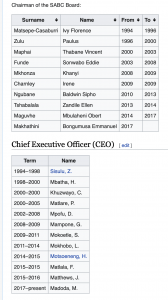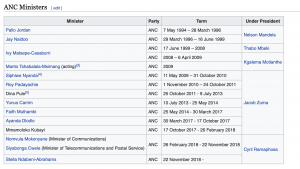My interest in the affairs, and particularly the finances, of the SABC has piqued in recent weeks as I read about government’s plans to turnaround this behemoth. The Department of Communications and Digital Technologies published a white paper on audio and audiovisual content services policy framework in October 2020 for public comment. I have no appetite to read this 153 page document and instead relied on media reports of aspects of the white paper. Apparently government want to transfer the responsibility of collecting TV license fees to Multichoice, Netflix, Showmax, Amazon Prime Video and AppleTV+. It suggests that Multichoice and subscription video on demand services (SVODs) such as Netflix should add annual TV license fees to its bills to South African subscribers and pay over collected amounts to the SABC. What an absolutely absurd idea. Imagine Netflix discontinuing your subscription because you failed to pay your SABC TV license?
Let’s talk about the TV licence mess. The SABC disclosed in its 2020 annual report that it had billed 9.5 million television license holders a total of R4.08 billion during the financial year. It only recognized R791 million of this as revenue in its financial statements as it expected that 81% of people owning TVs would not pay annual license fees. The SABC uses strong words such as ‘evasion’ to describe this behavior but I suspect South African citizens are revolting for different reasons. Imagine the collections in the 2021 financial year (FY) given the horrendous consequences of the COVID-19 lockdown? The TV license debacle gets worse when we consider how much the SABC spends on revenue collection and its annual bad debts write offs. The SABC spent R1.089 billion on revenue collection in FY2016. You should know all about that – those irritating text messages and those evening phone calls from debt collectors urging you to pay your TV license fees or else you will be reported to a credit bureau. Fat chance that had any affect on most South Africans. The SABC discontinued disclosing what its spends on revenue collection services after FY2016, presumably to avoid those awkward questions in parliament every now and again. It turns out the SABC is also not good at collecting corporate revenue – it wrote off a cumulative R425 million as bad debts over the 5 year period ended 31 March 2020.
I have attached an Excel spreadsheet SABC analysis (Dec 2020) analyzing the SABC financials over the period FY2012 to FY2020. It is not pleasant reading. The SABC’s financial position and profitability was okay until FY2015. In FY2014 it made a profit of R464 million before tax and had R1.4 million in the bank. Something tilted in FY2015 and it showed in the numbers as the organization incurred an operating loss of R601 million. I will give you a clue as to the causes – recall the mass resignation of the board of directors in 2013 and the reappointment of Hlaudi as Chief Operations Office? Recall Hlaudi’s antics as COO until his removal in late 2016? The SABC seems to have revolving doors at its head office – refer below for a list of its chairpersons and CEOs over the past decade (curtesy of wikipedia).
 You may recall Dr Ngubane’s (chairperson from 2010 to 2013) antics at the SABC and subsequently as Eskom chairperson. Ms Suzanne Vos made some damning statements about Dr Nbubane to the Parliamentary Monitoring Group in March 2013 following the mass resignations from the SABC board. She stated that Dr Ngubane was prone to making unilateral decisions without consulting the rest of the board of directors. He attempted to overturn board decisions such as the relieving Hlaudi of his position as acting COO. Dr Ngubane apparently also failed to attend meetings if he was angry or did not get his own way. That type of behavior clearly works as he was then entrusted to chair Eskom through difficult times. He was spectacularly unsuccessful at that and we are all living with the consequences of irregular power and another debt laden SOE (refer an earlier blog about Eskom and its inability to trade out of its debt burden).
You may recall Dr Ngubane’s (chairperson from 2010 to 2013) antics at the SABC and subsequently as Eskom chairperson. Ms Suzanne Vos made some damning statements about Dr Nbubane to the Parliamentary Monitoring Group in March 2013 following the mass resignations from the SABC board. She stated that Dr Ngubane was prone to making unilateral decisions without consulting the rest of the board of directors. He attempted to overturn board decisions such as the relieving Hlaudi of his position as acting COO. Dr Ngubane apparently also failed to attend meetings if he was angry or did not get his own way. That type of behavior clearly works as he was then entrusted to chair Eskom through difficult times. He was spectacularly unsuccessful at that and we are all living with the consequences of irregular power and another debt laden SOE (refer an earlier blog about Eskom and its inability to trade out of its debt burden).
The list of cabinet minsters in charge of inter alia the SABC is also quite revealing.
 The ANC seemed to take the Department of Communications seriously at the start of its rule by appointing heavyweights such as Pallo Jordan to oversee matters. Unfortunately, some of the appointees over the past 10 years had questionable reputations. Dina Pule was apparently adept at lying and cheating to benefit her then boyfriend back in the days. Faith Muthambi has been implicated in state capture given evidence at the Zondo Commission. She must have done some naughty stuff for OUTA to have laid treason and corruption charges against her in 2017. Mention Nomvula Mokonyane and I think Bosasa and Xmas braai packs. Stella Ndabeni-Abrahams was caught flagrantly disregarding lockdowns regulations earlier in 2020. She is now in the news for overturning the SABC board of directors decision to retrench 400 employees. Perhaps Stella needs to do a Corporate Governance 101 refresher.
The ANC seemed to take the Department of Communications seriously at the start of its rule by appointing heavyweights such as Pallo Jordan to oversee matters. Unfortunately, some of the appointees over the past 10 years had questionable reputations. Dina Pule was apparently adept at lying and cheating to benefit her then boyfriend back in the days. Faith Muthambi has been implicated in state capture given evidence at the Zondo Commission. She must have done some naughty stuff for OUTA to have laid treason and corruption charges against her in 2017. Mention Nomvula Mokonyane and I think Bosasa and Xmas braai packs. Stella Ndabeni-Abrahams was caught flagrantly disregarding lockdowns regulations earlier in 2020. She is now in the news for overturning the SABC board of directors decision to retrench 400 employees. Perhaps Stella needs to do a Corporate Governance 101 refresher.
Getting back to the SABC numbers, revenue seems to be under enormous pressure. Advertising revenue has declined from a peak of R6 billion in FY2016 to just over R4 billion in FY2020. The SABC records government grants as revenue, a very strange practice indeed. Imagine the creative accounting that could occur in the private sector if we could record monies received from shareholders as revenue? Total revenue at the SABC has been steadily declining in recent years and this trend is likely to continue as corporates and government finances remain under pressure.
The SABC’s largest expense items are content and salaries. I am not a SABC1, SABC2 or SABC3 viewer so I am unable to comment on the quality of the TV programs and shows. However, I do know that the quality of content is a key driver to viewer engagement and numbers. The salary line is troublesome. The average salary dramatically increased from R586,370 pr employee to R726,240 a year later. I do not know of any private sector business in South Africa that could afford to pay average salaries at these levels except for investment banks which operate in a parallel universe. The average salary in FY2020 had crept up to R791,316. The SABC is facing serious challenges to stay afloat and hence, the cry to National Treasury for more bailouts to survive. Revenue is declining and expenditures are rising, a tough predicament.
I recently listened to a podcast interview of Mr Bongumusa Makhathini, the incumbent SABC chairperson. He has had a remarkable ascent from rural KZN to a graduate with a passion to making a difference in South Africa. We need more leaders like Bongumusa in South Africa. Unfortunately, he is going to struggle to steer the SABC ship to safe waters given the challenges it faces. I was gobsmacked when I heard in the interview about how much the SABC pays Sentech on a monthly basis to transmit its analogue TV services and radio station programmes. I fact checked and discovered that the SABC currently pays Sentech R72.5 million per month for signal distribution. This revenue represents ±60% of Sentech’s revenue so now we are talking about contagion effects. If the SABC goes belly up, bye bye Sentech. Apologies for stating earlier that the SABC pays Sentech on a monthly basis – that’s not true as the SABC currently owes Senetch R340 million and is negotiating extended payment terms.
Stella and her merry crew are apparently also recommending regulations to force Netflix and other SVODs to adhere to a minimum of 30% local content on their streaming platforms. Oh my goodness, that could prove to be the end of my love affair with Netflix. Which global SVOD will allow a country at the tip of Africa to dictate to it on how it spend money on developing content? If I was Netflix, I would ignore the ANC cadres and move onto to other investor friendly destinations. I wonder if Stella and her crew thought about perhaps encouraging Netflix et al to spend money in South Africa developing new documentaries and TV series through promoting the beauty of South Africa, its cost effectiveness and by providing some tax incentives? We live in strange times.
Be safe and happy holidays. All the best from BeeechieB.

Leave a Reply